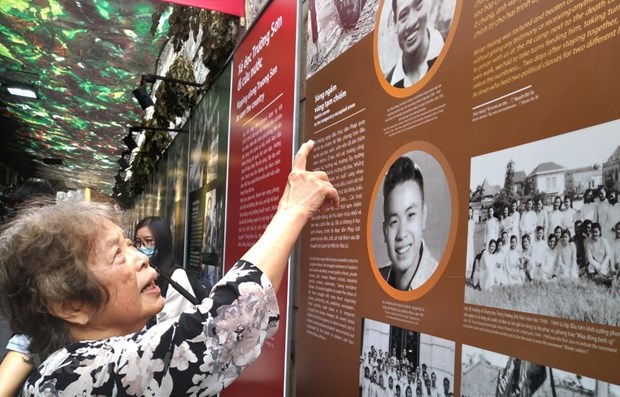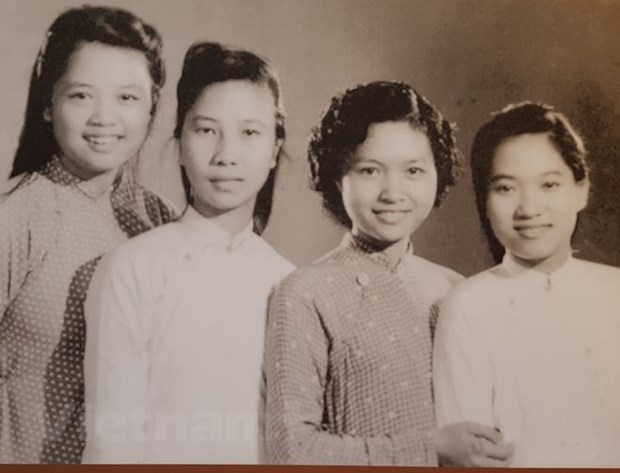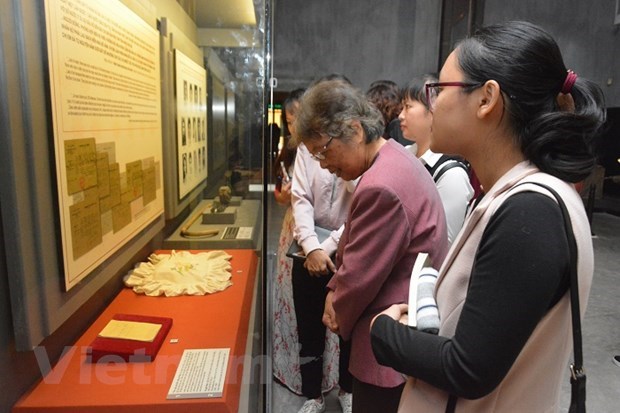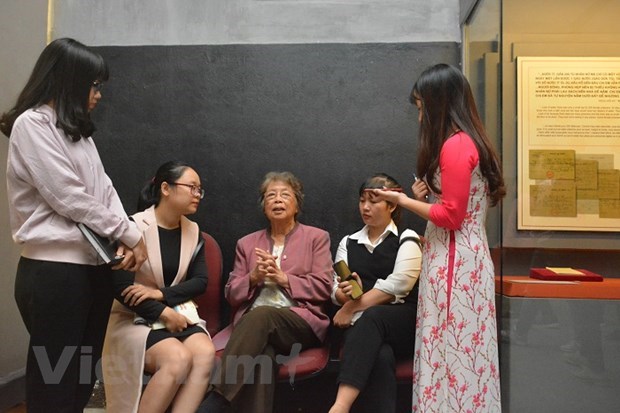Memories of vibrant patriotic youth movements
 Nhập mô tả cho ảnhDo Hong Phan recalls patriotic youth movements. (Photo: VNA)
Nhập mô tả cho ảnhDo Hong Phan recalls patriotic youth movements. (Photo: VNA)Hanoi (VNA) – Do Hong Phan, former head of the Department of International Cooperation under the Ministry of Water Resources (now the Directorate of Water Resources at the Ministry of Agriculture and Rural Development), has 70-year Party membership.
The 88-year-old woman said she joined revolutionary movements in late 1949 and early 1950 when she was a student of Chu Van An High School in Hanoi.
“Those were the most exciting days of my life,” she said, recalling the period when Hanoi was occupied by French colonists.
 Do Hong Phan (first, left) and other students who sang the song "Truong Ca Song Lo" (Lo River’s Epic) composed by musician Van Cao at the Opera House in 1950. (Photo courtesy of Do Hong Phan)
Do Hong Phan (first, left) and other students who sang the song "Truong Ca Song Lo" (Lo River’s Epic) composed by musician Van Cao at the Opera House in 1950. (Photo courtesy of Do Hong Phan)Although Phan was a student of the Chu Van An High School, she was assigned by the municipal youth union to serve as secretary of the resistance war youth union of Trung Vuong School.
Most of female students of the Chu Van An High School engaged in movements and assigned tasks to themselves. Phan did not know who was her leader, she just made efforts to complete her tasks.
Through the movements, her knowledge about the Party and proletarian revolutionary movements had been enriched. In June 1950, Phan received a decision admitting her to the Party.
“The Party admission ceremony was held in Nguyen Thi Dan’s warehouse that served as a venue for women joining the resistance war at Dong Xuan Market,” Phan reminisced.
She still remembered her superior’s advice: “In the enemy rear area, you would be captured and tortured by the enemy, but as a Party member, you must resolutely maintain your uprightness and stand ready to overcome all challenges.”
Hardships sharpen will
At the beginning of the 1950-1951 academic year, to celebrate Vietnam’s border defence war victory, the resistance war youth union of the Trung Vuong School planned to organise such activities as flag displaying, setting of firecrackers and distributing leaflets on November 7, 1950.
After the successful celebration, many students were arrested right at the Trung Vuong School.
 Do Hong Phan visits Hoa Lo Prison in Hanoi (Photo: VietnamPlus)
Do Hong Phan visits Hoa Lo Prison in Hanoi (Photo: VietnamPlus)In the prison, Phan and many others suffered from tortoises with electric shocks, but she rejected to say anything and cut herself with a broken bowl.
French soldiers then took her to Phu Doan medical facility (now Viet Duc Hospital) where she was treated in a private room with two guards working round the clock outside. After she was discharged from the hospital, Phan was moved to Hoa Lo Prison.
In the Hoa Lo Prison, the girl got the wholehearted care of other female political inmates, which made she feel warm and more secure.
However, she was then transferred to a solitary confinement cell that was lit up all day and night.
“The artificial light made me headache and unable to sleep,” Phan said. “I had to cover my eyes with clothes to take a rest.”
 Do Hong Phan (middle) recalls the day when she was imprisoned at the Hoa Lo Prison (Photo: VietnamPlus)
Do Hong Phan (middle) recalls the day when she was imprisoned at the Hoa Lo Prison (Photo: VietnamPlus)Despite the imprisonment, Phan sought ways to get information outside via her mother who came to visit her.
“Although students’ resistance movements were stamped out, they had still continued,” she said. “Many youth union members were sent to the So Mat Tham Dong Duong (General Security Police) and the Hoa Lo Prison. However, movements still spread across the school.”
Phan was released from the Hoa Lo Prison on January 21, 1951 as she was below under 18 years old at that time. She returned to the youth union and was sent to the liberated region.
After Hanoi was liberated on October 10, 1954, she came back to movements and the school in Hanoi.
Phan said she is proud to devote her lifetime to the nation, and hopes that young people will work to contribute to the cause of national development and integration./.













